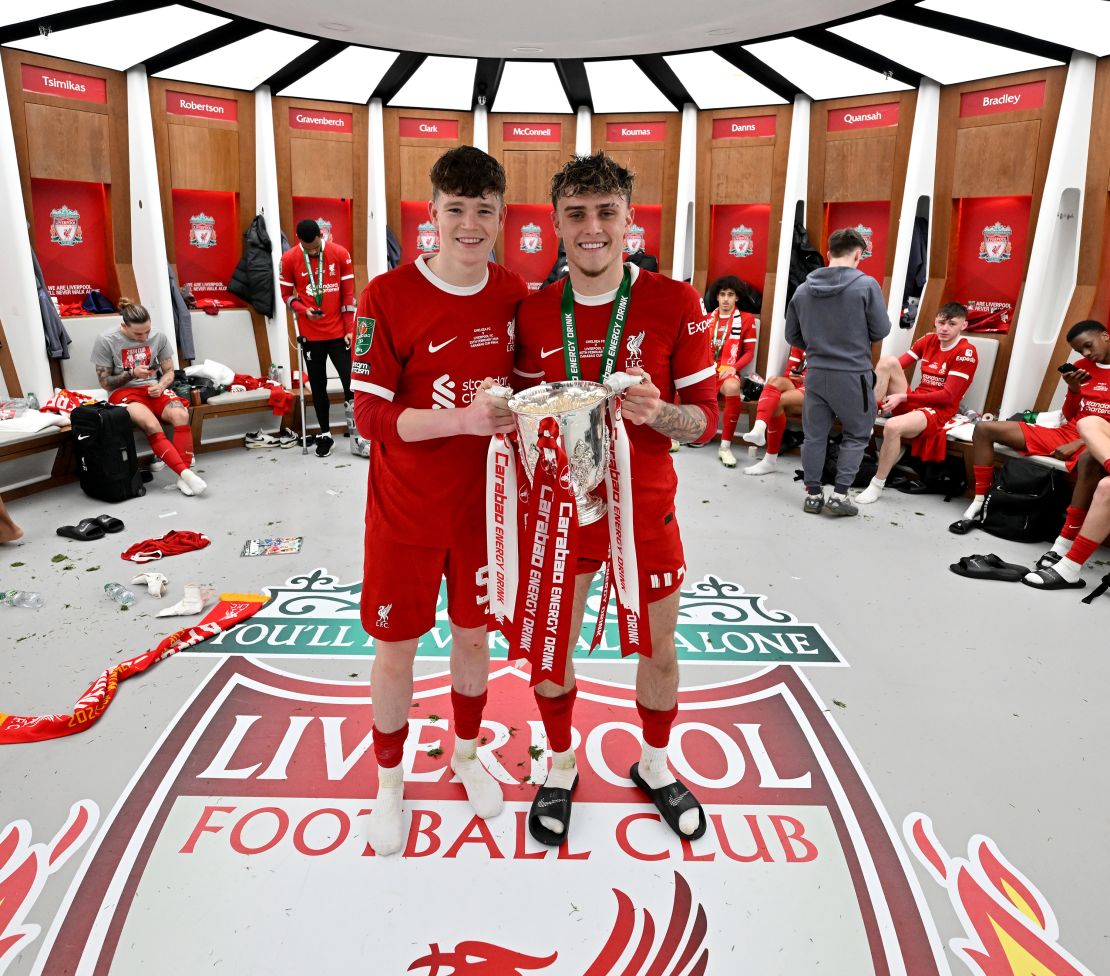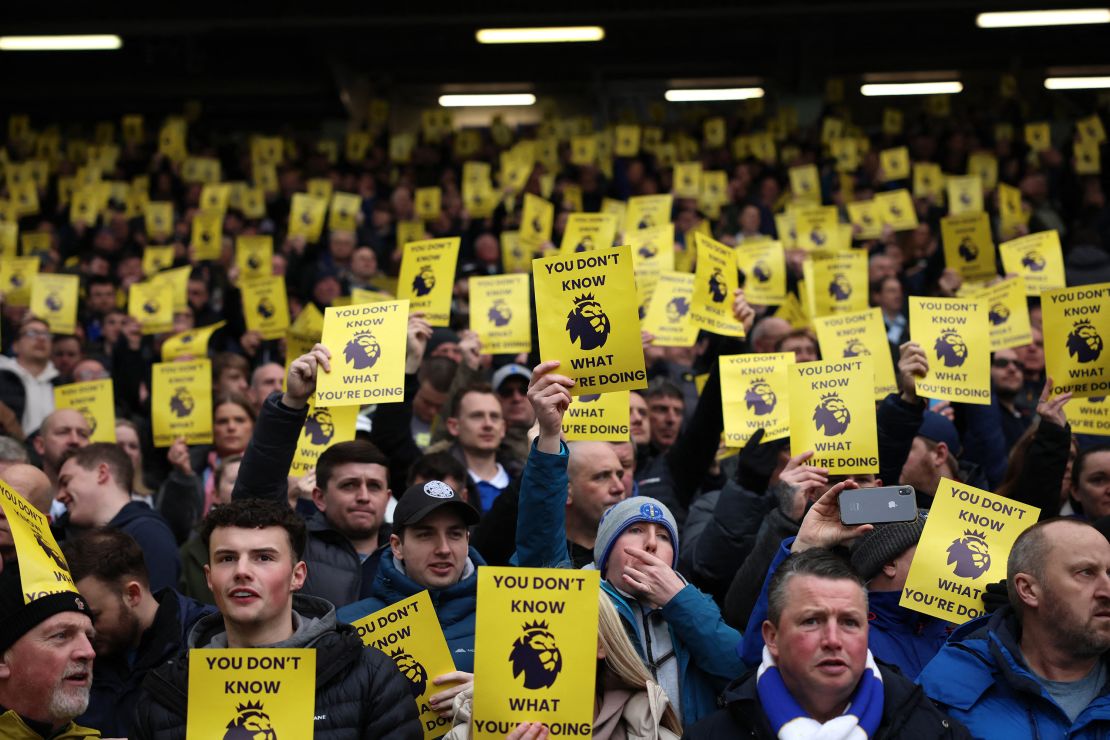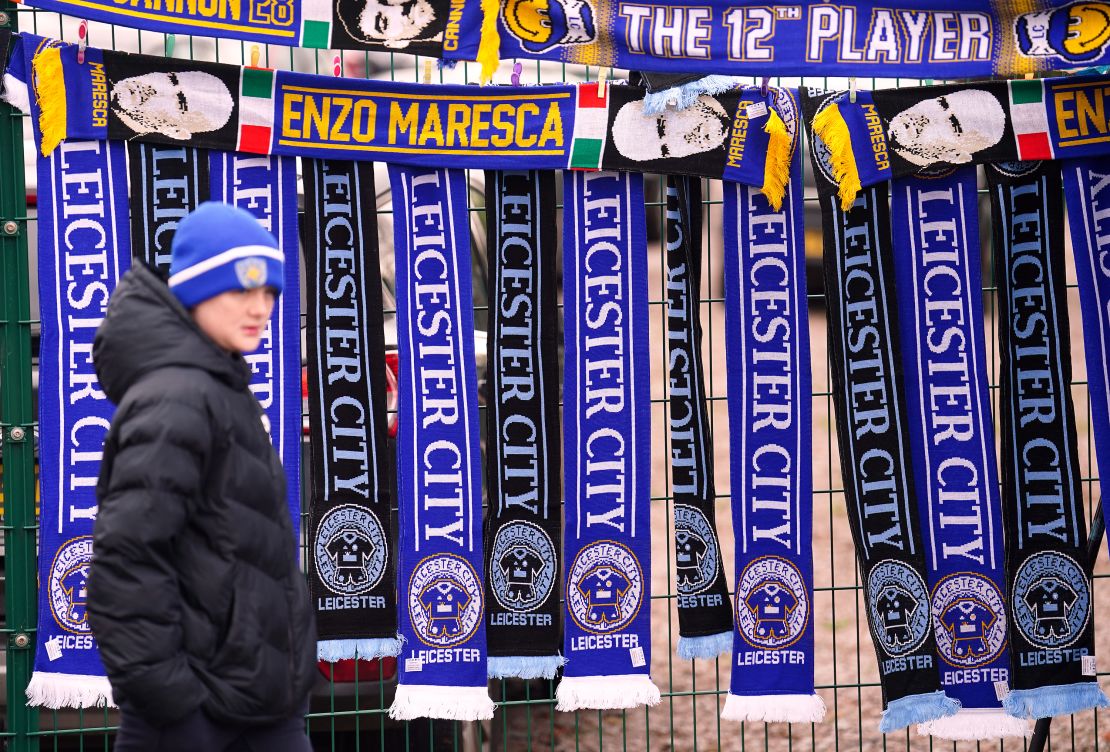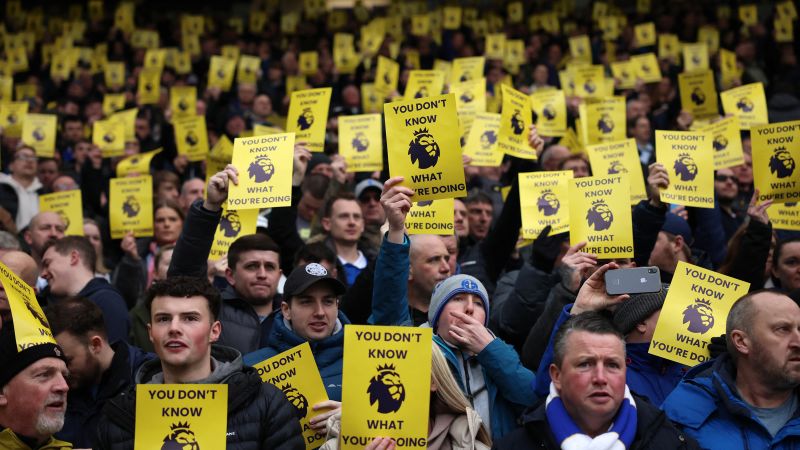CNN
—
In Istanbul in June 2023, Manchester City lift the Champions League trophy to cap a historic Treble-winning campaign.
Over a billion dollars has been spent by the club’s Abu Dhabi-based owners since 2008 in recruiting players to transform City into a footballing and commercial juggernaut.
Further down the soccer pyramid, Reading FC – recently relegated to the third tier of English football – is struggling to survive.
Failure to pay players and tax bills have resulted in multiple points deductions for Reading, as it slides down the league amid numerous fan protests over the way the club is run.
The contrast between the fortunes of Manchester City and clubs like Reading highlights the widening gap between the 20 teams in English soccer’s top-tier and the other 72 clubs, which come under the umbrella of the English Football League.
So much so that football finance expert Kieran Maguire told CNN that British football currently has a “peasants vs. Marie Antoinette” relationship. A hated figure symbolizing wealth and conspicuous consumption, Marie Antoinette is famed as the last queen of France before the revolution.
Disparity
Thanks to its multi-billion-dollar TV deals, the Premier League is often celebrated as a UK Inc. success story. Meanwhile, EFL clubs vainly to try to play catch up.
The financial disparity between the Premier League and EFL clubs is evident in their respective TV rights agreements. The most recent Premier League domestic broadcast deal is worth £6.7 billion ($8.5 billion) whereas the EFL’s TV deal with domestic package is worth £935 million ($1.19 billion).
According to the Premier League website, the TV money is divided amongst the teams in the league, with 50% divided equally between the clubs, 25% awarded on a merit basis determined by final league positions and 25% distributed as a facilities fee for televised matches.
While billion-dollar TV rights deals allow top-flight teams to sign the best talent from across the world, Premier League clubs are also very adept at hoovering up the most promising prospects from lower league sides.
For example, a member of Liverpool’s recent League Cup winning side – James McConnell – was signed from the Sunderland academy, while highly-touted 17-year-old Welsh forward Gabriele Biancheri was snapped up Manchester United from Cardiff City.

By targeting talents from lower-league academies, Premier League clubs don’t have to pay inflated transfer fees. It’s a sensible financial and recruitment strategy, but arguably denies lower league additional transfer revenue if they had been able to keep those prospective talents for a few more years.
According to reports in UK media, a recent proposed deal would have seen $1.14 billion (£900 million) shared by the Premier League with the rest of the English football pyramid. But reportedly only 10 Premier League clubs agreed to the deal, thereby not meeting the 14-out-of-20 requirement for it to pass.
Chair of the Culture, Media and Sport Committee and British MP, Caroline Dinenage said the actions of Premier League clubs “threatens the financial sustainability of clubs in communities up and down the country,” accusing the top-tier teams of “parking the bus.”
The EFL’s stance is that more money should filter down through the English football pyramid to help its sustainability, a move which wouldn’t affect the Premier League’s success story.
According to Maguire, the current impasse speaks to the lack of negotiating power the EFL has and the Premier League’s current voting structure.
“Ultimately, the Premier League is a member’s club. It has 20 shareholders; it needs two thirds of those shareholders to agree to a change in any of the rules or to give [Premier League chief executive] Richard Masters a mandate to negotiate and sign off the deal with the EFL,” Maguire told CNN.
“Therefore, it comes down to owners who have not been prepared to give up anything or give up very much because they would much rather have the cash now,” said Maguire.
“Everybody’s acting in self-interest as opposed to the greater good of the game and you can understand that. We’d all rather pay less tax than more tax but sometimes you need somebody to knock heads together and see the bigger picture.”
CNN contacted the Premier League for comment and they pointed towards Masters’ recent interview with The Times in which he talked about his concerns about an independent regulator.
“It is a risk to bring politics and lobbying into football, especially when there are also genuine concerns regarding how truly independent the regulator will be,” Masters wrote.
“We have spent the past year in discussions with the EFL about an even more generous financial settlement. But these talks have only served to highlight how destabilising intervention could be.
“The EFL has indicated it would happily accept a generous new deal from the Premier League but would also immediately use the new regulator to seek even more money for its clubs, including the Championship, which is already the sixth-richest league in Europe, with many very wealthy club owners of its own.”
‘Historic moment for football’
The UK government’s legislation for an independent regulator would grant powers to a body, independent of football and government authorities, that will oversee men’s soccer in England’s top five tiers.
The regulator will be able to block breakaway leagues like such as the European Super League, strengthen the tests for owners and directors of clubs and have powers to backstop the financial distributions between the Premier League, the EFL and National League, with the new body able to ensure a settlement is reached.
The mooted introduction of an independent regulator comes against the backdrop of some Premier League clubs falling foul of the Premier League’s Profitability and Sustainability Rules (PSR).
Everton and Nottingham Forest have been handed points deductions for breaching financial rules previously agreed by the 20 top-flight clubs. Earlier this month, Everton were handed a further two-point deduction for allegedly breaching Premier League financial rules.
And Manchester City – winners of five of the last six Premier League titles – has also been accused of breaching more than 100 financial rules, which includes failing to provide accurate financial information, failing to comply with UEFA’s financial fair play (FFP) regulations, and failing to follow Premier League rules on profit and sustainability.
The club has continuously denied any wrongdoing and a conclusion to their case reportedly remains some time away.
With both Nottingham Forest and Everton appealing the deduction of points, the final standings come the end of the Premier League season might be subject to change depending on the outcome of those appeals.

The final round of Premier League fixtures are played on May 19 with the outcome of Nottingham Forest’s appeal reportedly expected by May 24, five days after the final day of the season.
Both Forest and Everton are mired in a relegation battle near the bottom of the Premier League table, meaning the outcome of these appeals could have a dramatic impact on not only this season, but also the next one.
The Premier League has said it hopes to resolve Everton’s appeal before the May 19 finish of the current season.
The possibility of financial penalties ultimately deciding the fate of a 38-game Premier League season will potentially “damage the integrity” of the whole competition, according to Maguire.
“You have to be honest, as far as international fans are concerned, their focus is very much on the top of the league,” he explains. “I think there’s far more concentration on all the positions in the table domestically and yes, the Premier League will suffer short term reputational damage.
“As we’ve seen on many issues, football fans have remarkably short memories when it suits them and the focus within a few weeks, once the dust has settled on relegation, will be on who’s coming up, who’s going to be signed and so on in terms of summer transfer activity.”
When contacted by CNN for comment, the Premier League pointed to their commitment to the implementation of a “swift development and implementation of a new League-wide financial system.”
It added: “Premier League clubs also re-confirmed their commitment to securing a sustainably-funded financial agreement with the EFL, subject to the new financial system being formally approved by clubs.
“The League and clubs also reaffirmed their ongoing and longstanding commitment to the wider game which includes £1.6 billion distributed to all levels of football across the current three-year cycle.
“The Premier League’s significant funding contributions cover all EFL clubs and National League clubs, as well as women and girls’ football, and the grassroots of the game.”
Value of Premier League status
It’s not just in the Premier League where teams are falling foul of financial regulations.
Leicester City, who sit near the top of the second tier of English football, was charged in March by both the Premier League and the EFL for breaching financial rules.
Relegated from the Premier League in 2023, Leicester denies any wrongdoing and opened legal proceedings against the Premier League and the EFL, but could face a points deduction if found guilty.

If it is promoted at the end of the season, it could begin its return to life in the Premier League with the points deduction.
“Leicester City announcing that they’re going to issue proceedings against both the Premier League and the EFL has thrown a major spanner into the works,” Maguire said.
“Clearly the club is very unhappy with what has happened in regards to charges from both parties and therefore they’ve decided to fight back as best they can to defend their position.”






